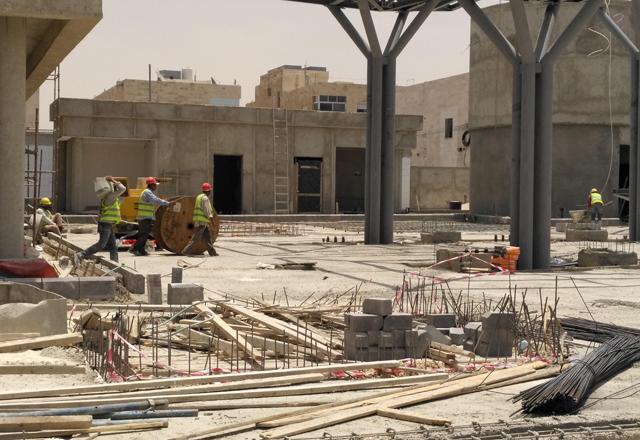You are here
Guest labourer wins again in lawsuit against government
By Laila Azzeh - Apr 05,2015 - Last updated at Apr 05,2015
AMMAN – The Court of Appeals has recently upheld a Magistrate Court’s ruling in favour of an Egyptian guest worker whose case has marked a judicial precedent.
Hamadeeno Najdi was the first guest worker to win a case against several state institutions late last year for being the victim of "arbitrary" measures by authorities.
The case was first filed in 2011 and dismissed, but it was appealed at the Magistrate Court in its appeal capacity.
Amman Magistrate Court Judge Haifa Kayyali ruled in favour of the 32-year-old worker, who filed a lawsuit against the then-interior minister, the Public Security Department director, the director of Jweideh Correctional and Rehabilitation Centre and the Amman governor for putting him in administrative detention in 2009 for 70 days, then detaining him for 13 months until his deportation, on the premises that such a long detention constituted excessive use of power on the part of the officials, and a violation to the relevant laws and international conventions Jordan has entered, in addition to the damage the plaintiff and his family incurred as a result of the arbitrary measures.
Najdi was arrested by Labour Ministry inspectors for not renewing his work permit, which the employer — who is responsible for permit renewal — had terminated after a dispute with him, according to Tamkeen for Legal Aid and Human Rights, which handled the labourer’s case.
The worker was then detained at the south Amman police station. Although the law does not allow detaining any suspect for more than 24 hours before referring him/her to court, he was kept in custody for more than two months.
Moreover, the Amman governor issued a decision to deport the Egyptian and keep him in detention until deportation measures were completed, resulting in detaining him for 13 months, according to Tamkeen.
The Egyptian national was released only after going on a hunger strike.
In her October 2014 ruling, which the Court of Appeals endorsed, Kayyali said the measures taken against Najdi had “arbitrarily” deprived him of his freedom and caused him psychological and financial damage, particularly as he came to work in a new country and had a wife and a young daughter.
"It was a matter of dignity when I filed the lawsuit. That is why I decided not to remain silent," Najdi told The Jordan Times over the phone from Egypt on Sunday.
"I feel that I have regained my dignity back," the now father of two daughters said, adding that although the experience was "psychologically and financially hard" — losing his five-year savings during the period in detention — he looks to return to Jordan to work again.
“The Magistrate Court forced the defendants to pay JD2,000 to the worker, while the Amman Court of Appeals decided to make them pay for Najdi's legal fees during the appeal stage," Tamkeen Director Linda Kalash told The Jordan Times on Sunday.
The court’s decision to compensate the worker is also very significant in the Kingdom’s history because it is in line with the International Covenant on Civil and Political Rights (ICCPR).
The judge ruled based on Article 9 of the ICCPR, which stipulates that “No one shall be subjected to arbitrary arrest or detention. No one shall be deprived of his liberty except on such grounds and in accordance with such procedure as are established by law,” in addition to other provisions safeguarding human rights during detention.
Kayyali also underlined that the measures taken against Najdi were “harsh and inhumane” according to Article 16 of the UN Convention Against Torture, which the Kingdom ratified in 2006.
"We hope that this case will change the legal landscape when it comes to the rights of guest workers," she said, noting that the case pushes Jordan's reputation forward as it shows that it respects international conventions on human rights.
Related Articles
For the first time in Jordan, a guest worker has won a case against several state institutions for allegedly taking “arbitrary” measures against him, according to a local advocacy group.
AMMAN — Originally a measure for authorities to resort to for "security reasons", administrative detention is "becoming the norm" when deali
AMMAN — When Hamdin Najdi immigrated to Jordan from Egypt, he did so on an agricultural work permit, and like many agricultural workers almo

















